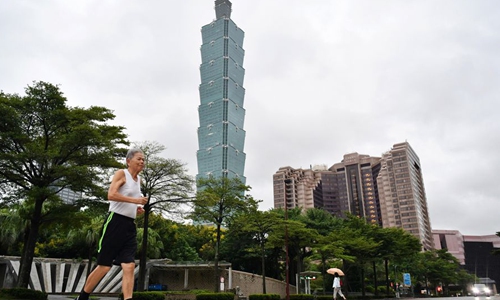HOME >> CHINA
Taiwan separatists use COVID-19 to poison cross-Straits ties
By Yang Sheng Source:Global Times Published: 2020/4/8 0:23:40

A citizen runs in front of the Taipei 101 skyscraper in Taipei, southeast China's Taiwan, on Oct. 1, 2019. (Xinhua/Chen Bin)
The song "Fight as One" by pop singers Eason Chan from Hong Kong and Jolin Tsai from Taiwan in support of medical staff and people around the globe fighting the COVID-19 pandemic has received cyber violence from Taiwan separatists as the extremists said this is a "foreign propaganda from the Chinese mainland."
Chinese mainland experts noted that the separatists were using the pandemic to poison cross-Straits ties and the society of the island has already been radicalized. The cyber violence against the song was just another example to prove the island's society was already radicalized by the separatist authority and many people were atomically being hostile to anything about the mainland,analysts said. The separatists ignore the humanitarian principle, and the pandemic has been used as a good chance for the separatists to push their political purpose worldwide, they noted.
The English video by the state-owned Yunnan Media Group was uploaded on YouTube on Friday and had received more than 470,000 views as of Tuesday, but most comments were negative.
The song, which expressed support and gratitude toward medical staff and people battling the pandemic, was criticized harshly by Taiwan's web users who noted the "Chinese national flag appeared in the video" and "foreign children held up paintings thanking China for its assistance to their countries."
"The producer was a mainland media group and the two pop stars were serving a propaganda mission," the online critics argued.
Li Xiaobing, a Taiwan studies expert at Nankai University in Tianjin, told the Global Times Tuesday that "in the past, when the mainland was facing a huge disaster, like the 2008 Wenchuan Earthquake, Taiwan-based pop stars did a lot of public welfare programs in support of the mainland, and at that time, no one got criticized and the ideological difference between the two sides could be laid aside.
"But today, any support for the mainland from Taiwan-based singers can be treated as a 'betrayal of Taiwan' on the island - even a song that doesn't mention Taiwan at all."
The angry online response to the song demonstrated a "radicalized" atmosphere on the island, Chinese experts said.
When the mainland was suffering the most serious situation in January and February, the separatist Democratic Progressive Party (DPP) authority banned export of medical masks to the mainland.
On April 1, the DPP authority announced a donation of 10 million masks to the US and European countries even as people in Taiwan were only allowed to buy nine masks per person per two weeks, Taiwan-based media reported.
"There is nothing wrong with donating masks to people in need, but the DPP authority shows very different attitudes toward the mainland and the West," said Li.
That was why people in the mainland felt "disgusted," Li said.
"The mainland has massive production capacity and is already the logistics base of this global fight and we don't need masks from Taiwan, but still, Taiwan separatist behavior is poisoning the ties with the mainland."
Some separatist Taiwan media outlets use the term "Wuhan virus" or "China virus" for COVID-19 even after US President Donald Trump stopped using the phrase and most mainstream media outlets dropped it to avoid discrimination against specific region or country.
"We are being treated as a family member in Beijing, but the authority in Taiwan just refused us to come back, and the media of my hometown even keep saying stigmatizing words to the mainland every day without any help," Joseph Lam, a Taiwan student at a Beijing-based university, told the Global Times.
"Their radicalism can't even accept a song which just talks about love and encourages people to be strong. What a shame."
Chinese mainland experts warned the pandemic was being used by the DPP authority and separatists of the island to maximize their political purpose such as hyping Taiwan's non membership of the World Health Organization and exaggerating Taiwan's "contribution" and "performance" to the global fight.
Li, the Tianjin-based expert, noted that some voices from the West dubbed mainland assistance "mask diplomacy," but in fact Taiwan is the one who actually using masks for politics such as making some politicians in France urge WHO to accept Taiwan as a formal member.
Chinese Embassy in France has released an open letter on its website on Monday to condemn such behavior.
According to the island's regional leader Tsai Ing-wen's announcement on April 1, the authority will donate 7 million masks to Europe and 2 million to the US. And according to the French health ministry, the mainland will provide 1 billion masks to France.
China has donated 1,000 ventilators to New York state and Chinese IT firm Huawei also donated thousands of masks and personal protective equipment to the US, even the firm is still under sanctions and unfairly treated by the US government.
Li said some US and European politicians and media did not show gratitude to the mainland and remained critical and suspicious over China-made products, but they treated Taiwan as a "true friend."
Chinese mainland experts noted that Taiwan separatists won't achieve their purpose eventually and there was no chance for them to join any international organization as a formal state.
But the separatists can successfully make people on the mainland resent them and lose hope of a peaceful solution to the Taiwan question, they warned.
Posted in: SOCIETY
